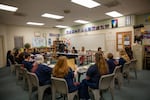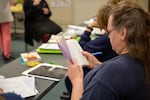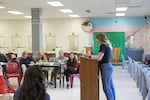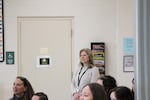Deb Arthur cherishes the brief handwritten notes she’d get.
The messages at the bottom of assignments returned to the Portland State University professor would say "Hi" or "Hope you're OK" — signed by women in custody she'd spent the last year teaching.
But months after launching the first general education course at an Oregon women’s prison, Arthur wasn’t sitting in class with her students. She wasn’t even able to lead online classes. Instead, she was emailing attachments to staff at the Coffee Creek Correctional Facility in Wilsonville so they could be printed and handed out to the women in custody.
It’s the final week of spring term for Portland State University students. And for a group of women at Coffee Creek, it’s the end of a year-long journey to be among the first women to get a full year’s worth of college credits while serving a sentence.
Men in custody have had that opportunity for years.
OPB followed the class over this first year, from classroom readings to research papers and through the upheaval of COVID-19 at a correctional facility.
'I didn’t think I would see it happen'
It’s October, the fourth week of classes for students in “Metamorphosis,” a 15-credit course that incorporates reading, writing and class discussion on different themes each term.
For this term, PSU professor Deb Arthur has had students read and talk about individual change and growth.

Students in PSU's new "Metamorphosis" class at Coffee Creek Correctional Facility take notes during class in October. The class is ending its first year. As spring semester comes to a close, in-person classes have ended and work is assigned via printed out packets.
Elizabeth Miller/OPB
“We're starting at the beginning,” Arthur said. “It's centered on students who are incarcerated and what their needs are and helping them build a college transcript from the ground up.”
Surrounded by books, posters and a whiteboard, the women discussed the book “Educated” by Tara Westover. It’s about a woman whose life changed when she sought an education.
“We just thought it was kind of a perfect choice to start here with these women,” Arthur said. “They’re all either high school grad or equivalent. But it’s their first year of college for most of the women.”

In October, students incarcerated at Coffee Creek Correctional Facility discussed readings about individual growth and change. It was the fourth week of class for students in "Metamorphosis" -- a 15-credit general education course offered for the first time this year.
Elizabeth Miller/OPB
Susan Corbett has been incarcerated since 2003. She found it frustrating that there weren’t many educational opportunities for women beyond a GED program, a domestic violence course and workforce training.
“I didn’t think it would happen before I got out,” Corbett said back in October.
Corbett said college was not available to her when she was younger. Now 52, Corbett is taking the first steps to a college degree. Four weeks into class, she was enthusiastic.
“We’re just getting more and more excited by sharing our own thoughts about what we’re reading and gleaming from it,” Corbett said. “I feel that energy in our housing units, in our workplaces.”
Corbett and the other women pay a minimum of a third of the cost of class, but PSU accepts donations to offset the cost of class and books.
PSU's Arthur said this class is not unique, but it's a first of its kind offering to women incarcerated in the state. Oregon's incarcerated men have access to courses offered at community colleges and through Corban University, according to the Department of Corrections. But even then, a recent federal report from the Council of State Governments found no Oregon institution provides bachelor's degrees.
Arthur hopes to change that with her program and the Metamorphosis course.

A student in PSU's new "Metamorphosis" class at Coffee Creek Correctional Facility looks through a journal back in October. The 15-credit general education course was offered for the first time this year -- because of COVID-19, the class is ending differently than it started.
Elizabeth Miller / OPB
“We’d like to see an associate’s level, and working closely with PCC to explore whether that’s possible … and also have PSU offer full bachelor’s degrees, that would be the goal,” Arthur said.
Research findings from the RAND Corporation and the Justice Department show prison education reduces recidivism rates.
Like many institutions, the women at Coffee Creek are permitted to take correspondence courses — a print-based class that relies completely on mailed-in work. But Arthur said a real classroom experience can provide a solid introduction to higher education for women who have never been in college — or haven’t been in years.
“There’s a supportive group of students who are all hungry and eager for this educational opportunity,” Arthur said. “They are prepared, they are engaged, and it’s a beautiful way to teach.”
Coffee Creek student Sarah Martin agrees. She said the PSU course has offered her an opportunity to start towards an eventual degree in Sociology.
Martin is part of a group of incarcerated women inside Coffee Creek called Rubicon GPS. They’ve been advocating for higher education for women in custody.
“We believe education is all inclusive, and we do not have a lot of these opportunities here,” Martin said in October.

PSU capstone students and incarcerated women at Coffee Creek Correctional Facility listen to final presentations in March. The meeting was the last in-person class for the students. As spring semester comes to a close, work is done via printed out packets.
Elizabeth Miller/OPB
“We want to help be productive here, but what if you want to go beyond your high school education? There’s been a lot of disparity between that and a gap between getting those college credits.”
Martin said she and the other Coffee Creek students had to work to get into the class and prove they wanted to be in the class. Back in October, as fall term picked up, Martin was happy with her choice.
“I feel it’s been exactly what I wanted,” Martin said.
“It’s a lot more than I expected, and I’m looking forward to the next eight months.”
Working with students on the 'outside'
Six months later, in March, Martin and the other Coffee Creek students sat in the visitation room with PSU seniors from the outside.
The PSU seniors participate as part of a capstone course, with capstone instructor PSU Debbie Rhutt co-teaching the class with Arthur.
“These [PSU] students are pursuing their degree, and these women are pursuing a degree, they’re just in a different place,” Rhutt said. “One of the beautiful things that happens — these students who are seniors and maybe feeling a little burned out at this point, are reinspired.”
Some of the PSU students are studying criminal justice or social work, but the class has drawn other majors too.

One of the incarcerated women in PSU's "Metamorphosis" class gives a presentation in March. That was the last in-person class for the students. As spring semester comes to a close, work is done via printed out packets.
Elizabeth Miller/OPB
The PSU seniors helped the Coffee Creek “freshmen” with their final research papers, doing research for them.
The Coffee Creek students were able to pick their own topics within the term’s theme of “social change.” Each woman took turns presenting about their topics. Some relied on history or statistics in their presentation. Others made it more personal, like Martin.
She connected the women’s suffrage movement to her own work with Rubicon GPS.
“Whether in prison or outside communities, the cause of women’s rights fits into the larger focus of equality for all,” Martin said.
COVID-19 cancels classes and all in-person interactions
That March 10 class was the last time Arthur saw her students. The next class was set to be the final exam. Arthur was able to drop off packets to the prison, but after that, Oregon’s public universities moved courses online due to coronavirus.
At the same time, the pandemic shut down all of Oregon’s correctional facilities to visitors, and the state’s prisons aren’t set up to support online education. For a while, Arthur couldn’t even pass along paper assignments.

Incarcerated women in Portland State University's "Metamorphosis" class could choose any topic they wanted for their final research paper of winter term. Some chose Japanese-American internment and presented their topics in March - the last time the Coffee Creek students had class in-person.
Elizabeth Miller/OPB
Lately, she’s been able to send her assignments online and have Coffee Creek staff print them out.
Arthur said this spring hasn’t been ideal for her incarcerated students. The class has been more similar to the correspondence course model Arthur had wanted to avoid.
“I feel like the packets are better than no communication and no exchange at all, but certainly not ideal,” Arthur said.
With in-person classes canceled, Arthur hasn’t been able to talk to her students. But in the months before coronavirus cut her off from her students, Arthur built relationships that her students worked to maintain, like through the handwritten notes they’d leave her on the papers they’d hand in.
“It’s been really hard to not be able to be in contact with these students I’ve been working with since September,” Arthur said. “But we get these little messages, and I’m really hopeful for some face to face time whenever that may be.”

Deb Arthur, right, watches student presentations at Coffee Creek Correctional Facility in March. The class was the last in-person one before COVID-19. As spring semester comes to a close this week, work has been assigned via printed out packets.
Elizabeth Miller/OPB
No one, including Arthur, knows when that will be. Unlike other educational settings, Coffee Creek did not have the infrastructure to transition from in-person classes to virtual ones.
But Arthur sees a silver lining in the pandemic.
“I feel like this is an opportunity to really think more broadly about what we’re trying to do, and why, and how to do it,” Arthur said.
She’s been in meetings with other prison education providers, hoping to strengthen offerings in Oregon’s prisons. Arthur said this time has really highlighted barriers incarcerated students in Oregon face — including a lack of technology inside.
“Now’s an opportunity to really think through that and build a stronger, more robust infrastructure,” Arthur said.
While her students continued to turn in classwork, she worried about their physical and mental health. There haven’t been any cases of coronavirus at Coffee Creek, but inmates testing positive at other facilities are being moved there.
“Just like with any student that I’ve ever worked with, the student is more important than the content,” Arthur said.
Not every Coffee Creek student that started the course finished the year. Some of the students may take a few more weeks to catch up with their spring coursework and pass.
And next year, PSU has received funding from the Sunshine Lady Foundation for another year of Metamorphosis, as well as a Business 101 course.
But what Arthur doesn’t know is whether those classes will be in-person.